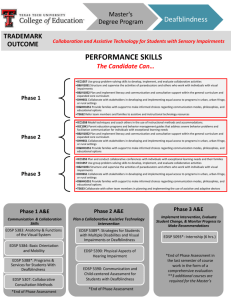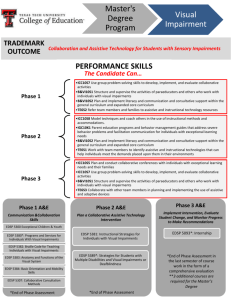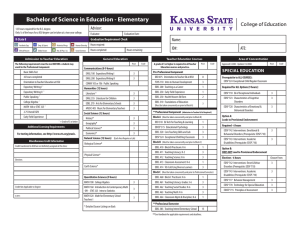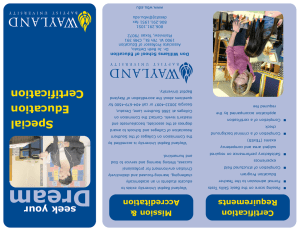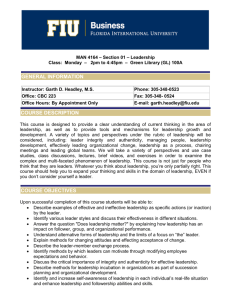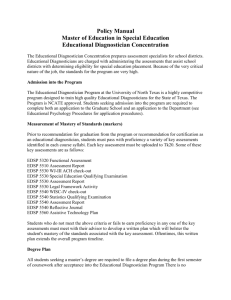EDEL 685/EDTL 604 - Morehead State University
advertisement
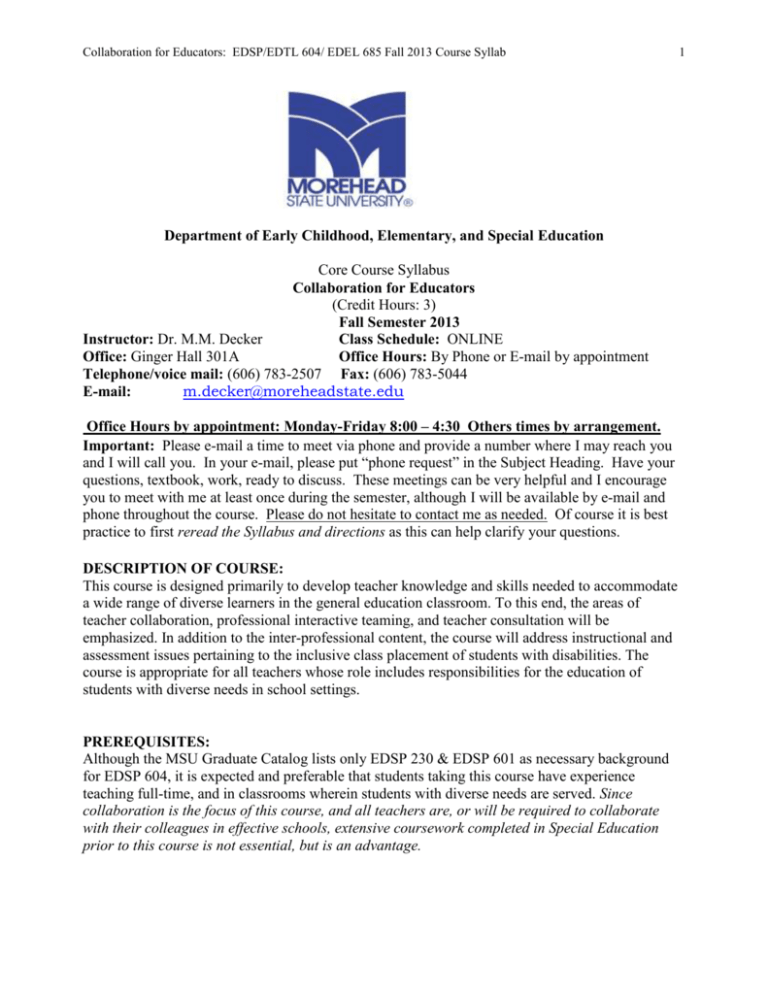
Collaboration for Educators: EDSP/EDTL 604/ EDEL 685 Fall 2013 Course Syllab Department of Early Childhood, Elementary, and Special Education Core Course Syllabus Collaboration for Educators (Credit Hours: 3) Fall Semester 2013 Instructor: Dr. M.M. Decker Class Schedule: ONLINE Office: Ginger Hall 301A Office Hours: By Phone or E-mail by appointment Telephone/voice mail: (606) 783-2507 Fax: (606) 783-5044 E-mail: m.decker@moreheadstate.edu Office Hours by appointment: Monday-Friday 8:00 – 4:30 Others times by arrangement. Important: Please e-mail a time to meet via phone and provide a number where I may reach you and I will call you. In your e-mail, please put “phone request” in the Subject Heading. Have your questions, textbook, work, ready to discuss. These meetings can be very helpful and I encourage you to meet with me at least once during the semester, although I will be available by e-mail and phone throughout the course. Please do not hesitate to contact me as needed. Of course it is best practice to first reread the Syllabus and directions as this can help clarify your questions. DESCRIPTION OF COURSE: This course is designed primarily to develop teacher knowledge and skills needed to accommodate a wide range of diverse learners in the general education classroom. To this end, the areas of teacher collaboration, professional interactive teaming, and teacher consultation will be emphasized. In addition to the inter-professional content, the course will address instructional and assessment issues pertaining to the inclusive class placement of students with disabilities. The course is appropriate for all teachers whose role includes responsibilities for the education of students with diverse needs in school settings. PREREQUISITES: Although the MSU Graduate Catalog lists only EDSP 230 & EDSP 601 as necessary background for EDSP 604, it is expected and preferable that students taking this course have experience teaching full-time, and in classrooms wherein students with diverse needs are served. Since collaboration is the focus of this course, and all teachers are, or will be required to collaborate with their colleagues in effective schools, extensive coursework completed in Special Education prior to this course is not essential, but is an advantage. 1 Collaboration for Educators: EDSP/EDTL 604/ EDEL 685 Fall 2013 Course Syllab 2 COURSE OBJECTIVES/COMPETENCIES: Upon completion of the course, students will be able to: Explain the rationale underlying changes in the role of special education teachers to one that places more emphasis on collaboration to provide services to students with special needs. Describe strategies for extending the role of special education and teachers to include skills in collaborative preparation, instruction, and management. Describe differences between collaboration and consultation, and explain advantages and disadvantages of each practice. Describe skills needed by effective resource consultants and collaborating teachers. Create a plan for your school or community using collaborative and/or consultative skills in school and/or community setting in order to effect positive change in student academic and/or social behaviors. Research/Present project of best practice(s) and model programs using collaboration, exemplifying ‘what works’! Students are encouraged to be innovative and creative in designing collaborative projects in their communities and schools! RELATIONSHIP OF THIS COURSE TO THE EXPERIENCED TEACHER STANDARDS FOR PREPARATION/CERTIFICATION OF THE KY EDUCATION PROFESSIONAL STANDARDS BOARD The course objectives/competencies directly address the Experienced Teacher Standards required by the Kentucky Education Professional Standards Board for the training and preparation of experienced teachers. In particular, students in this course will develop their knowledge and skills to varying degrees in the following Experienced Teacher Standards, through class content presentation and through implementation of and reporting on the two applied assignments: EXPERIENCED TEACHER STANDARD I: DEMONSTRATES PROFESSIONAL LEADERSHIP Standard Statement I: The teacher provides professional leadership in the school, community, and education profession to improve student learning and well-being. EXPERIENCED TEACHER STANDARD II: DEMONSTRATES KNOWLEDGE OF CONTENT Standard Statement II: The teacher demonstrates content knowledge within own discipline(s) and in application to other discipline(s). EXPERIENCED TEACHER STANDARD III: DESIGNS/PLANS INSTRUCTION Standard Statement III: The teacher designs/plans instruction to develop student abilities to use communication skills, apply core concepts, become self-sufficient individuals, become responsible team members, think and solve problems, and integrate knowledge. EXPERIENCED TEACHER STANDARD IV: CREATES/MAINTAINS LEARNING CLIMATE Standard Statement IV: The teacher creates a learning climate that supports the development of student abilities to use communication skills, apply core concepts, become self-sufficient individuals, become responsible team members, think and solve problems, and integrate knowledge. EXPERIENCED TEACHER STANDARD V: IMPLEMENTS/MANAGES INSTRUCTION Standard Statement V: The teacher introduces/implements/manages instruction that develops student abilities to use communication skills, apply core concepts, become self-sufficient individuals, become responsible team members, think and solve problems, and integrate knowledge. Collaboration for Educators: EDSP/EDTL 604/ EDEL 685 Fall 2013 Course Syllab 3 EXPERIENCED TEACHER STANDARD VI: ASSESSES AND COMMUNICATES LEARNING RESULTS Standard Statement VI: The teacher assesses learning and communicates results to students and others with respect to student abilities to use communication skills, apply core concepts, become self-sufficient individuals, become responsible team members, think and solve problems, and integrate knowledge. EXPERIENCED TEACHER STANDARD VII: REFLECTS/EVALUATES TEACHING/LEARNING Standard Statement VII: The teacher reflects on and evaluates teaching/learning. EXPERIENCED TEACHER STANDARD VIII: COLLABORATES W/COLLEAGUES/PARENTS/ OTHERS Standard Statement VIII: The teacher collaborates with colleagues, parents, and other agencies to design, implement, and support learning programs that develop student abilities to use communication skills, apply core concepts, become self-sufficient individuals, become responsible team members, think and solve problems, and integrate knowledge. EXPERIENCED TEACHER STANDARD IX: ENGAGES IN PROFESSIONAL DEVELOPMENT Standard Statement IX: The teacher evaluates own overall performance in relation to Kentucky’s learner goals and implements a professional development plan. This course uses a UNIVERSAL DESIGN for Learning which addresses: 1) diversity, through the candidates’ exposure to individuals with disabilities and neurodiversity of all individuals; 2) technology, through the DVD/video recordings, podcasts,and the use of the Internet in accessing course information and communicating with the instructor; 3) evaluates candidates in their authentic learning tasks in the field through evaluation of the formative and summative documentation of the collaborative projects. COURSE STRUCTURE: Within the Universal Design for Learning (UDL) framework there are MULTIPLE MEANS of REPRESENTATION; ENGAGEMENT; AND EXPRESSION: A combination of readings, response papers, small group discussion forums and weblogs, as well as whole group problem solving, and projects to demonstrate acquisition of collaboration skills is included. On a regular basis, students also will report on progress being made with the continuing tasks throughout the semester. Active participation is essential to developing the skills being developed in the course. A schedule of the class topics each week and the corresponding required readings are provided. Additional information will be provided in course Blackboard announcements, describing the content, organization, and evaluation criteria for the assignments to be completed during the semester. Collaboration for Educators: EDSP/EDTL 604/ EDEL 685 Fall 2013 Course Syllab 4 COURSE TEXT: (Required) Friend, M. & Cook, L. (2007) Interactions: Collaboration skills for school professionals. White Plains, NY: Longman Publishers USA. Suggested Readings : These are three books I will be using throughout the course to enhance the fine concepts and thoughts of Friend and Cook. Two vital aspects of our CONTEXT together this semester are COURAGE and CREATIVITY! To do this we begin with the BRAIN. We will also be using the CAST website throughout in learning how to use the framework of a UNIVERSAL DESIGN for LEARNING (UDL). http://www.cast.org Cozolino, L. (2013). The Social Neuroscience of Learning. Norton. Palmer, P. J. (2007) The Courage to Teach. Jossey-Bass. Collaboration for Educators: EDSP/EDTL 604/ EDEL 685 Fall 2013 Course Syllab 5 Zander, R.S. & Zander, B. (2000) The Art of Possibility. Penguin Books. BEFORE YOU BEGIN ON THE JOURNEY: A Word to the Wise: FIRST! READ the PREFACE of the Textbook and pay special attention to the design and order of each chapter’s readings: Every chapter begins with a “CASE for Collaboration”—a case study that frames the week’s theme. I strongly suggest taking notes as you read and consider this Case Study as your context of the particular chapter’s topics. You will want to reference this in your week’s work. This will help you to see how each chapter fits in the whole of the book. > Each week Blackboard opens on Monday morning and closes on the following Saturday at 11:55 p.m.< Week Beginning Topics Required Reading from… Chapter 1 Friend & Cook 8/19 - 8/24 Chapter 1 “Foundations and Perspective” 1-25 What is Collaboration? What does it look like? How do you know it is happening? When have you seen it? Rationale for collaboration; Fundamentals of collaboration and inclusion Legal mandates for schools re inclusion & collaboration Appraising your school as an environment conducive to collaboration. *A Case for Collaboration (1) and Activities (25) Week 2 8/26 – 8/31 Chapter 2 “Interpersonal Communication” (26) It’s all about Communication! Views, Concepts, Principles Competence and Improving Your Communication Skills *A Case for Collaboration and Activities (52) Week 3 9/2-9/7 Chapter 3 “Listening, Responding, and Giving Feedback” (54) Nonverbal Communication; Listening and Communication; Principles for Effective Verbal and Nonverbal Feedback *A Case for Collaboration Activities (81) Week 4 Chapter 4 9/9-9/15 “Integrating Skills in Interviews” (82) Seeking Information; Providing Information; *A Case for Collaboration and Activities (105) *CONDUCT INTERVIEW* Week 1 Collaboration for Educators: EDSP/EDTL 604/ EDEL 685 Fall 2013 Course Syllab Week 5 Chapter 5 9/17- 22 “Interpersonal Problem Solving” (106) Reactive and Proactive problem solving; diversity Response to Intervention (RTI) Steps in Problem Solving * A Case for Collaboration Activities (133) Week 6 Chapter 6 9/23 - 29 TEAMS (134) Characteristics, benefits; models; effectiveness of teams Clear goals, accountability. * A Case for Collaboration and Collaborative Activities (159) Week 7 Chapter 7 10/1 -6 “Co-Teaching” (160) Defining Co-teaching! Characteristics; Co-teaching approaches; *A Case for Collaboration (182) and Collaborative Activities (187) Week 8 Chapter 8 10/7 -13 “Consultation, Coaching, and Mentoring” (188) Consultation concepts; characteristics; models; coaching; mentoring *A Case for Collaboration and Activities (208) Week 9 Chapter 9 10/14 -20 “Difficult Interactions” (212) Understanding Conflict; causes of conflict; understanding resistance; Putting the pieces together! *A Case for Collaboration and Activities (238) *Appendix 9.1 “Conflict Management Style Survey” (240) Week 10 Chapter 10 10/21 -27 “PARAEDUCATORS” (244) Paraeducator qualifications; Instructional responsibilities; Ethical considerations; Roles and responsibilities; *A Case for Collaboration and Activities (265) Week 11 “FAMILIES” (266) Chapters 11 Understanding Families*Family Systems Theory* Family Life Cycles; Cultural 10/28 -11/3 Influences; Unique Factors and Barriers to Collaboration *A Case for Collaboration (268) Collaborative Activities (291) Week 12 Chapter 12 11/4- 10 “Community and Interagency Contexts” (292) Community Outreach; School-Community Partnerships; Community Liasons; Early Intervention and Preschool Settings Vocational and Community-Based Services *A Case for Collaboration (294) “ISSUES Related to Education Collaboration” (308) Professional roles and responsibilities; systemic barriers; Collaboration in the Electronic Age; Students; Ethics. *A Case for Collaboration (310) and Activities (333) Weeks 14-16 Class Collaboration Projects, Weblogs, Wikis and Presentations Week 13 Chapter 13 11/11 - 17 6 Collaboration for Educators: EDSP/EDTL 604/ EDEL 685 Fall 2013 Course Syllab 7 IMPORTANT PROCEDURES FOR WRITTEN ASSIGNMENTS: The candidate’s performance evaluation will be determined by the following: The instructor expects all assignments to be turned in on time, in Blackboard, on a Microsoft word document containing a Header with Name, Assignment and Date using Times New Roman (12 font) on all work. Assessment in this course is QUALITATIVE rather than QUANTITATIVE. No points are earned, rather each assignment is evaluated by the quality of thought, presentation, care with writing and editing of all surface errors. A= Clearly Outstanding Over and beyond Excellence, in substance, thought, knowledge of content, presentation and has few or no surface errors. B= Excellent Excellent quality of work in substance, thought, knowledge of content, presentation; contains a few surface errors. C= Satisfactory Satisfactory quality of work in substance, thought, knowledge of Content, presentation; contains multiple surface errors or compositional errors. D= Not satisfactory Unsatisfactory quality of work, lacks evidence of knowledge of content, lacks thoughtful response, contains multiple errors. *** Explanation of assignments and their values explained in the following tables. Assignment Descriptions: Early Childhood, Elementary, and Special Education Assessment % of Final Description Grade Weekly Chapter Readings and Reader Responses 25% Textbook Ancillary Materials Podcasts, Video presentations Reviews 10% Weekly Discussion Board Forum 25% Interview with Person on Collaboration 10% Final Project (3 Parts) 30% (EDSP 601) Each chapter contains the CORE of the coursework. Careful reading and thoughtful responses are the key to success with these assignments. Each chapter will contain opportunity for reflection and application which will also be valuable work toward the final project, a comprehensive paper of ‘best practice’ in some area of choice by the student, on Collaboration for Educators. ASSIGNMENTS for each week must be submitted no later than 11:55 p.m. on Saturday evening. Follow directions for download and listen to Podcasts and view Videos as assigned; Access online web resources with chapters. High speed internet access is required to listen and view these. Public Libraries, Camden-Carroll Library and other facilities can provide this if you do not have this at home. *** Complete assignment details in Blackboard. Candidates are expected to log-in weekly and respond to Whole Class or Group Forum assigned. *** Complete assignment details in Blackboard. Write a summary paper describing the interview and value in learning about collaboration (or the person’s experiences of it) *** Complete assignment details in Blackboard. Write a 10 page paper (APA style required) on an area of particular interest on Collaboration. Create a Power point presentation of key points of research. *** Complete assignment details and Rubric provided in Blackboard. Collaboration for Educators: EDSP/EDTL 604/ EDEL 685 Fall 2013 Course Syllab Grading Scale: 8 Protocol and Format REQUIRED for ALL Assignments: 90% - 100 % A (Clearly Outstanding) 80% - 89% B (Excellent) 70% - 79% C (Expected) 60% - 69% D (Below Expected) 0% - 59% E (Failure) 1. Create a Header with Name, Course # and Section #, Date and Assignment Title in upper right corner. 2. Use Times New Roman, 12 – Font ONLY 3. Double – space all assignments 4. Use 1” margins all sides 5. “Person-first” Language is REQUIRED 6. Edit before submitting for any surface errors, typos. Class Participation Participation in this online course is essential. While predominately you are working alone, you are INTER-ACTING with the ideas, concepts and new ways of working within a school that requires a depth of reading and reflection. Weekly class activities and discussions comprise an essential part of the learning experience. Full participation means looking beneath the obvious, surface learning and beginning to search for deeper meanings and ways to implement what is being learned. Written reflections will be a part of all assignments and students who show evidence of metacognition, thinking about their thinking—and questioning previous assumptions, is vital in mastering these elements of Collaborative work. SPECIAL NEEDS ACCOMMODATIONS Any student with special learning needs as described under The Americans with Disabilities Act (ADA, 1990) should contact the course instructor during the first week of classes. It is important to discuss any accommodations that are needed, or that might assist in ensuring that the student is able to complete all the work assigned in the course. In addition, any student who wishes to discuss specific learning difficulties experienced in understanding or completing course requirements is welcome to do so, and should not hesitate in contacting the instructor. The success of every student in meeting the course objectives is the major goal of the course. Though a request for services may be made at any time, services are best applied when they are requested at or before the start of the semester. To receive accommodations and services the student should immediately contact the Disability Services Coordinator in the Office of Academic and Career Services, 223 Allie Young Hall, 606-783-5188, www.moreheadstate.edu/acs/ . *Important note: In this online format it is vital to keep communication with the Instructor. Please contact by e-mail or phone when you have any question or concern. I am available to meet with you in person as well if you prefer.
